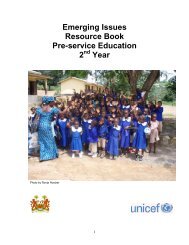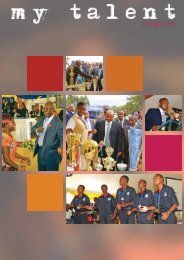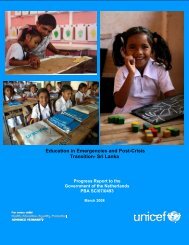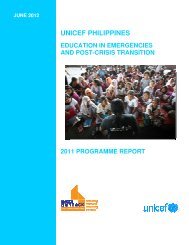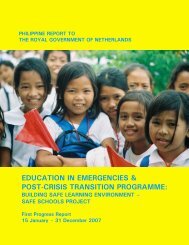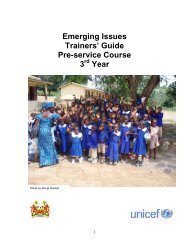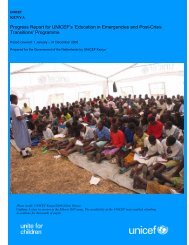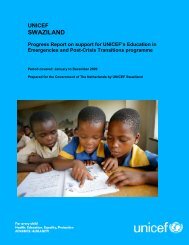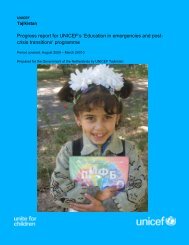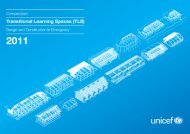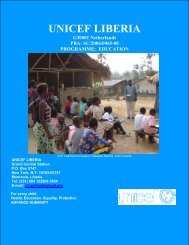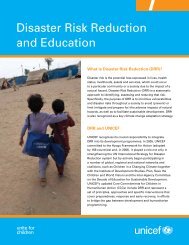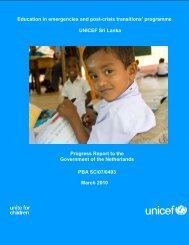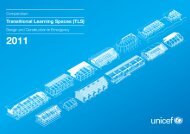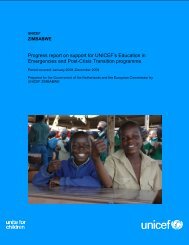Disaster Risk Reduction in School Curricula: Case Studies ... - Unicef
Disaster Risk Reduction in School Curricula: Case Studies ... - Unicef
Disaster Risk Reduction in School Curricula: Case Studies ... - Unicef
You also want an ePaper? Increase the reach of your titles
YUMPU automatically turns print PDFs into web optimized ePapers that Google loves.
190<br />
Section 10.<br />
<strong>Case</strong> 30:<br />
The <strong>Case</strong> <strong>Studies</strong><br />
Nigeria<br />
Overview<br />
Nigeria is currently undertak<strong>in</strong>g a formal<br />
curriculum review with a view to <strong>in</strong>tegrat<strong>in</strong>g<br />
climate change adaptation, disaster risk<br />
reduction and gender issues at all levels<br />
of curricula.<br />
Its emphasis on l<strong>in</strong>k<strong>in</strong>g gender issues<br />
with DRR and climate change adaptation<br />
will be worth monitor<strong>in</strong>g, especially given<br />
that DRR and climate change are rarely<br />
approached through a gender lens<br />
<strong>in</strong> school.<br />
Introduction<br />
At the time of writ<strong>in</strong>g (November 2011), climate change and<br />
DRR curriculum <strong>in</strong>tegration at both the primary and secondary<br />
level are ongo<strong>in</strong>g but <strong>in</strong> their early stages <strong>in</strong> Nigeria.<br />
The National Education and Research and Development Council<br />
(NERDC), the government agency responsible for curriculum<br />
development, is undertak<strong>in</strong>g a DRR curriculum review <strong>in</strong><br />
conjunction with the National Emergency Management Agency<br />
(NEMA). Their curriculum development <strong>in</strong>itiative falls under<br />
the Africa Adaptation Programme (AAP) 126 , launched <strong>in</strong> 2010<br />
by the United Nations Development Programme (UNDP) <strong>in</strong><br />
partnership with the United Nations Industrial Development<br />
Organization (UNIDO) and UNICEF with f<strong>in</strong>ancial support from<br />
the Government of Japan 127 . In addition to develop<strong>in</strong>g national<br />
climate change policy, an advocacy network, hydropower<br />
generation and more adaptive farm<strong>in</strong>g practices, AAP for Nigeria<br />
undertakes school curricula reviews as well as the development<br />
and implementation of teacher education programmes on<br />
climate change. UNICEF-led components <strong>in</strong>clude improv<strong>in</strong>g<br />
skills-based education to address issues of climate change<br />
at the basic education level (UNICEF WCARO, 2011).<br />
Curriculum Development/Integration<br />
Upon the completion of the curriculum review by NERDC and<br />
NEMA climate change, DRR and gender issues will be <strong>in</strong>tegrated<br />
<strong>in</strong>to relevant subjects 128 .<br />
There is agreement among the key stakeholders <strong>in</strong>volved <strong>in</strong><br />
the curriculum review and development process that no new<br />
subjects will be created and DRR themes and topics will be<br />
<strong>in</strong>fused <strong>in</strong>to carrier subjects.<br />
The latest DRR curriculum plann<strong>in</strong>g document (drafted by<br />
NERDC, NEMA, experts from the University, Fire Service,<br />
Primary and Secondary <strong>School</strong> system) are structured accord<strong>in</strong>g<br />
to a consistent three to five key themes for all grades at primary,<br />
junior secondary and senior secondary school levels. They are:<br />
‘You and <strong>Disaster</strong>’, ‘<strong>Disaster</strong> Disk <strong>Reduction</strong> Practice’, ‘<strong>Disaster</strong><br />
Management’, ‘<strong>Disaster</strong> <strong>Risk</strong> <strong>Reduction</strong> Adm<strong>in</strong>istration’, ‘Safety<br />
Measures aga<strong>in</strong>st <strong>Disaster</strong>s’. At the junior secondary level,<br />
the topic of civil unrest appears under these themes (NERDC/<br />
NEMA, 2011).<br />
Pedagogy<br />
Pedagogical approaches are to be developed once the curriculum<br />
review is completed. The Teacher’s Guidance Pack on Climate<br />
Change Adaptation, <strong>Disaster</strong> <strong>Risk</strong> <strong>Reduction</strong> and Gender Issues,<br />
currently under development, is be<strong>in</strong>g drafted as a collaborative<br />
venture between the Fresh & Young Bra<strong>in</strong>s Development<br />
Initiative, the Federal M<strong>in</strong>istry of Education and UNICEF (FME/<br />
UNICEF, 2011a).<br />
The Teacher’s Guidance Pack lists of curriculum <strong>in</strong>tegration<br />
po<strong>in</strong>ts for teach<strong>in</strong>g about climate change adaptation, DRR<br />
and gender issues <strong>in</strong> the follow<strong>in</strong>g subject areas: Agriculture,<br />
Biology, Chemistry, Computer Science, Economics, English,<br />
English Literature, Elementary and Integrated Science, F<strong>in</strong>e and<br />
Applied Arts, Food and Nutrition, Geography, History, Home<br />
Economics, Introductory Technology, Mathematics, Other<br />
Languages, Physical and Health Education, Physics, Religious<br />
and Moral Instruction, Social <strong>Studies</strong>. Examples <strong>in</strong>clude:<br />
Mathematics: simple calculations of carbon and ecological<br />
food pr<strong>in</strong>ts, equations and gender equality<br />
126<br />
Alice Akunga & Judith Giwa-Amu, UNICEF Nigeria, to Fumiyo Kagawa,<br />
19, 31 October 2011.<br />
127<br />
http://www.undp-aap.org/<br />
128<br />
Kayode Fagbemi, National Emergency Management Agency,<br />
to Fumiyo Kagawa, 29 November 2011.<br />
<strong>Disaster</strong> <strong>Risk</strong> <strong>Reduction</strong> <strong>in</strong> <strong>School</strong> <strong>Curricula</strong>: <strong>Case</strong> <strong>Studies</strong> from Thirty Countries



